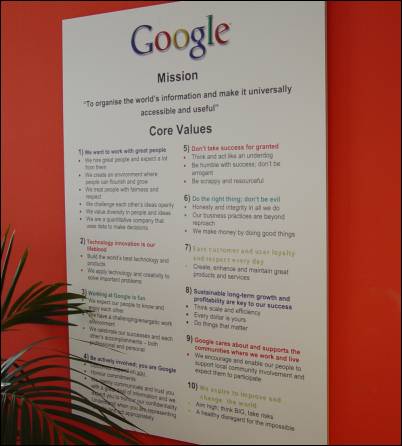Monday, July 2, 2007
Google’s Ad "Democracy"
When I was shown around Google Hamburg to take some snapshots earlier this year, there wasn’t any research & development in sight. Instead, the 100-plus employees at the German Google headquarter are mainly divided into three groups: the public relations department, which tries to communicate to the press and watch over Google’s image; the ad sales department, which was split up into many sub-departments (like health, legal, entertainment, industry, each with their own items on display as pictured above); and the system administration, who ensure that the former two departments can get their work done hassle-free. A lot is known to the outside world about Google’s many smart engineers, but relatively little is known about the work of the ad space sales people.
Google now called the advertisement market place they’ve created a “democratic way” to “participate in public dialogue” (in response to another blog post by Google’s Lauren Turner criticizing the movie Sicko, as mentioned earlier). This market place displays ads both on Google search results through AdWords, as well as on websites and blogs (like this one, too) in the form of AdSense. A couple of things are remarkable about this “democracy”:
- In this “democracy,” it will cost you money to participate; the more money you have, the more you can participate.
- This “democracy” co-exists with a second, somewhat competing democracy; the one under the rule of PageRank, which Google says relies on “the uniquely democratic nature of the web” by analyzing links.
- In this “democracy,” Google is actively involved in talking to the various candidates to spend their campaign money with them.
Let’s take a look at each of the three characteristics.
1. You need to pay to participate
For the first point we can find easy proof: it costs you money to create an AdWords campaign, and the more money you invest in the campaign budget, the more often your ad has a chance to be displayed. Now that’s the case on average; other factors, such as click rates on your ad, play a role too, so you should be smart about the ad’s message. Then again, you can also spend over $50 a day with Google AdWords, and if you’re new to the program that will hire you a Google employee to write “compelling ads promoting your product or service" for you as part of the Google Jumpstart program.
2. Search ads co-exist and compete with search results
To analyze the second point – the ads “democracy” co-exists with web search results democracy – we’ll take a hypothetical search for “Acme Inc” on Google. If the official company homepage AcmeInc.com turns up on top for that search, there is no reason for Acme Inc to invest in an ad campaign (well, Google Inc regularly does that with their own products even when these are already top-ranked, but that’s a different story; perhaps they’re so rich they can accommodate for fluctuation due to local/ personalized results). Why? Because clicks on AcmeInc.com in the web democracy are free to begin with, as the web voters decided that AcmeInc.com was the most relevant result for this search query.
As this example illustrates, there are only a couple of real reasons left to advertise with Google, switching from the link democracy to that paid “democracy”: 1) your site is so new that you have reason to believe the web democracy didn’t yet get a good look at it to cast its fair votes, 2) you believe that the “public should be educated” about an issue on which it cast the wrong vote, by your measurement, 3) your site is merely related to the search query, offering something the searcher might not have thought of but might find useful in retrospect, or 4) your site is irrelevant, harmful or misleading, which is why people steered clear of linking to it.
Oftentimes in Google search results it’s indeed the latter case, that a site advertised is much less relevant than the top-ranking ones from the “non-paid democracy”... which is why many experienced searchers avoid clicking on AdWords in search results. (A fifth reason comes to mind when we move to look at those ads displayed on webmaster’s sites, outside of Google search results: the aim to restate a message over time; a product or service may be relevant but also older, and the site owner might have shifted focus to other topics of relevance.)
As Google’s business is to “sell user demand” (to quote Patrick Keane, Google’s Head of Advertising Sales Strategy in 2004), the company as whole has the two conflicting tasks of selling ads to Acme Inc, while improving the relevancy of their web results to make users stay, which in turn can lower Acme Inc’s incentive to pay.
A somewhat similar conflict is apparent not just in search results, but also Google applications like Gmail (which must keep “the ads non-intrusive,” as Google employee Niniane Wang told us, even though those ads are the Gmail revenue). It’s also apparent in the same health sector Google aims to sell ads in. Google’s Adam Bosworth for instance is doing officially sanctioned lobbying for quite some time now for people to “access all online health data about them” (it’s not hard to imagine that Google wants to play a role in this area then, too – “we at Google may be able to help,” as Adam puts it), and he says: “Consumers can organize into communities which are protected from inappropriate commercial exploitation but allow consumers to share their experiences with others whose medical situations are similar”.

One of Google’s self-proclaimed core values, displayed at Google Hamburg as well, is “Our business practices are beyond reproach,” followed by “We make money by doing good things.”
3. Google campaigns for you to spend your money with them
The third point is somewhat less known about Google, which people often think of as purely engineer-driven (which, as a Google engineer told a group of us this year, it’s certainly not always; the ad sales people get more respect in certain meetings because they’re the ones directly driving in revenue, whereas engineers are the ones creating costs. I’ll grant this wasn’t an official Google statement, nor do I believe it’s shared by every engineer internally). Google in their “consumer packaged goods” blog clarifies that Google’s sales teams “are organized by industry so that we can focus on the distinctive qualities and business needs of our advertisers and marketers.” (Not all industry needs are cared for though; hard liquor, firearms and cigarettes are not permitted, for instance; so are ad texts “advocating against any ... person”.) In their opening post, the consumer packaged goods blog wrote, “Our goal for the blog is to communicate with you, our advertisers and agencies.”
Google has different other public ways outside of blogs to communicate with potential advertisers. Their industry overview page collects such areas as automotive, real estate, healthcare or travel, providing tips and case studies. One of the case studies provided in a healthcare context study mentions how an advertiser wasn’t able to use mass spam mails anymore due to the arrival of “more sophisticated spam filters” but was happy to find a new home at Google AdWords:
Given its shoestring budget when it started, DentalPlans.com used bulk email as its main marketing tool. “We had no money to pay for advertising,” Babyak recalls. But with the advent of more sophisticated spam filters, that was no longer a good solution. The co-founders turned to Google AdWords to reach their customers more effectively. Babyak remembers typing “dental plans” into Google’s search engine and seeing another company’s ad listed first. Babyak’s reaction was instantaneous: “We want to be there too,” Babyak said.
On Google’s automotive page, Google connects to advertisers by stating that “Google’s renowned search results give us tremendous reach to the millions of buyers looking for cars and auto products online,” claiming that “Google is #1 in automotive search referrals, sending more traffic to auto sites than all other search engines combined.”
But don’t expect a clear-defined agenda here for particular industries – Google is not in this to e.g. specifically sell more cars – except going for the biggest budgets; another case study aims to analyze how Viacom’s Paramount Vantage film division built awareness for the movie An Inconvenient Truth through advertising. (Google goes on to attribute the movie’s breaking of the “all-time per screen record for any documentary movie in history” to the “impact of Paramount Vantage’s marketing campaign.”) And Google sells ads to campaigners within meaningful areas of our lives, as well as the more trivial ones... and everything in-between. Google in another case study writes:
The name of Clif Shakun’s website, HospitalGowns.com, may describe his product clearly enough. But it doesn’t reveal his passion for providing colorful and comfortable designer hospital gowns and surgical caps. The customer testimonials on his site demonstrate that Shakun has struck a chord with customers around the world. Scores of people have written enthusiastic endorsements and heartwarming stories about facing health emergencies and anticipated surgeries, and how much better things seem to go when wearing his memorable designs. Doctors, dentists, veterinarians, nurses and other healthcare professionals also buy his surgical caps to inject some color and fun into their workplace.
All that in mind, it’s an interesting “democracy” indeed. Danny Sullivan of Search Engine Land has a less complicated state form to offer, though: “Google ought to get back to just selling space and not trying to be an ad agency to these groups. That’s what ad agencies do, and they aren’t hit by the burden of also having to run supposedly unbiased information resources.”
>> More posts
Advertisement
This site unofficially covers Google™ and more with some rights reserved. Join our forum!

